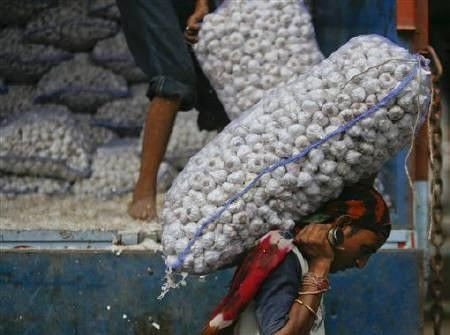India Inflation at 9.73 Percent; Complicates Monetary Policy

India's headline inflation was unchanged in October, worse than forecast and above the 9 percent mark for the eleventh straight month, complicating monetary policy for the Reserve Bank of India.
The RBI has raised interest rates 13 times since early 2010 but has failed to contain price pressures which are threatening to hit double-digit levels due to supply and transport bottlenecks and high global commodity prices.
The RBI acknowledged in its October review that growth risks were being reflected in slowing economic indicators for Asia's third-largest economy, but still raised its policy lending rate, the repo rate, by 25 basis points. It also said that if inflationary pressures started to abate by December, more rate hikes may not be needed.
Annual wholesale price inflation in October stood at 9.73 percent versus 9.72 percent in September, as local prices for energy and food continued to rise despite a sharp pullback in global commodity prices in recent months. Fuel price inflation in October stood at 14.79 percent while food inflation was 11.06 percent.
The RBI, which has been the world's most aggressive central bank in fighting inflation, has now become an outlier as global economic risks grow.
Elsewhere in Asia and in parts of Latin America, some central banks are moving to a more accommodative stance or preparing to do so in the face of mounting global risks, with central banks in Indonesia and Australia cutting interest rates in recent weeks and others such as the Bank of Korea toning down its rhetoric on inflation.
RBI statements have puzzled economists. It has left its forecast for WPI inflation by March 2012 unchanged at 7 percent while downgrading growth forecasts, acknowledging it expects high inflation levels to persist for a further two months and warning of the risks of a premature end to policy tightening.
To some economists, it suggests unwillingness on the part of the bank to recognise rate rises have had little impact on inflationary pressures but inflicted heavy damage on investment. The government bond yields and swap rates inched higher, while the rupee trimmed gains after slightly higher-than-expected October inflation data.
Data is in line with expectations. I don't think the RBI will lower its vigil yet on inflation concerns, said Kumar Rachapudi, fixed income strategist at Barclays Capital in Singapore.
At 11:35 a.m., the most-traded new 10-year bond yield was up 1 basis point at 8.97 percent from before the data.
The benchmark five-year swap and the one-year rate both inched up 1 basis point each to 7.38 percent and 8.13 percent, respectively, traders said. The main share index extended gains marginally to be up 0.85 percent.
Data on Friday showed India's factory output grew at its slowest pace in two years in September, suggesting high domestic interest rates, worries about Europe's debt crisis and fragile global demand were dampening industrial activity in India.
UNDERLYING INFLATIONARY PRESSURES STRONG
Local food prices, which are largely outside the domain of monetary policy, have risen sharply in October and with little help from the government to ease supply-side pressures, it is a key contributing factor to high inflation. Food price inflation slowed slightly to an annual 11.81 percent in the week to October 29, government data showed on Friday.
Last week state run refiners raised gasoline prices by 2.7 percent, the fourth increase in a year and a move which will further stoke inflationary pressures in the economy. The economy has also been hit by a depreciating rupee which fell to its lowest level in two and a half years on Friday thus making oil imports more expensive. India imports 75 percent of its oil consumption.
Core inflation, which excludes food and fuel prices, is still high, indicating persistent price pressures in the economy.
However, Subir Gokarn, a deputy governor of the Reserve Bank of India said on Friday that interest rates may have peaked and he sees inflation moderating, reinforcing expectations it will pause its policy tightening at its next policy review in December policy.
© Copyright Thomson Reuters {{Year}}. All rights reserved.





















